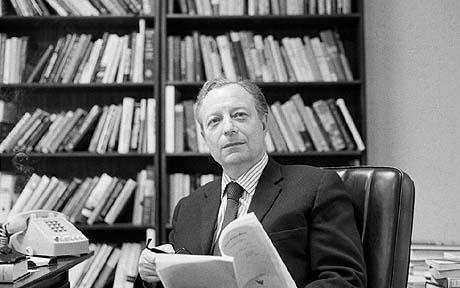
By David Ross. The word “neo-conservatism” suffered a wild and unfortunate distortion during the last nine years, coming to mean something like “the neo-fascist philosophy of George W. Bush and his Satanic cohort,” or even more simply, “the wicked tendency to invade other countries.”
Given this slippage of meaning, I cannot recommend highly enough Joseph Dorman’s documentary Arguing the World (1998), which provides a thoughtful and accurate account of neo-conservatism as it traces the careers of literary critic Irving Howe, political thinker Irving Kristol (father of Bill), Columbia/Harvard sociologist Daniel Bell, and Harvard sociologist Nathan Glazer. The story will be familiar to conservatives who know their own lineage: bookish, Jewish New Yorkers arrive at City College; fall under the spell of Trotsky; revolt against the murderous tyranny of Stalin; begin to qualify their leftism; cast their lot with the high modernism of Partisan Review; found Commentary; begin to take seriously the Soviet threat; increasingly recognize the perverse incentives and disincentives created by LBJ’s Great Society; recoil from the brainless nonsense of the counter-culture; begin creating the intellectual foundations of modern conservatism in a series of groundbreaking books and articles; preside over conservatism’s return to power on the back of their own ideas.
While remaining strictly neutral and objective, Arguing the World explains these weighty developments in American political and intellectual history and rescues an important tradition from cartoonish caricature.
Posted on July 27th, 2010 at 10:11am.
David – I had not heard of this documentary anywhere. Thanks for the heads up. Is it available on Netflix?
It is available through Netflix. Enjoy!
David: who do you think are their contemporary equivalents today? Who would you say are our major conservative intellectuals? It seems as the conservative movement has grown larger, it has adopted increasingly populist rhetoric that attacks “elites” and the result is that it has forced many serious intellectuals out. Would those bookish, City College-educated thinkers have any place in the conservative movement today of Glenn Beck and the rest?
I think their type still exist to some extent. I would say they congregate around two publications in particular: City Journal and Commentary, both of which are largely accessible on-line. Have a look. That being said, the kind of dizzying, high-wire intellectualism of the original neo-conservative generation probably is, as you suggest, a thing of the past. I remember one of my early posts for the revived Libertas in which I quoted Yeats. In one of the early articles on Libertas, some blogger, in a mood of mild lampoon, responded, “Yowza, them’s long words!” So it goes.